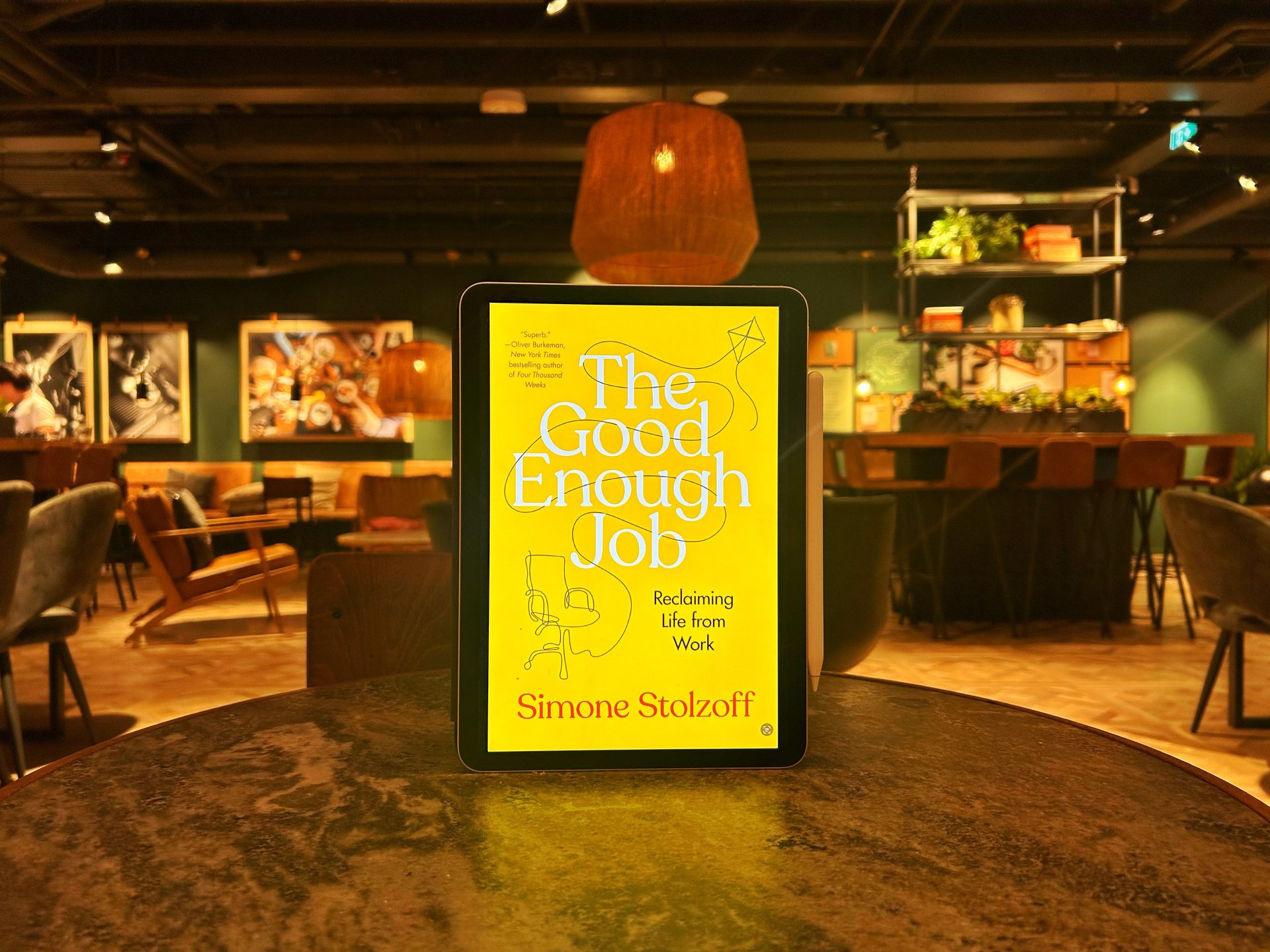The Good Enough Job: Reclaiming Life from Work highlights the myth that our worth is tied to our careers. While the book focuses on the U.S. work culture, I believe it happens worldwide and its message is universal. Simone Stolzoff shares stories from various industries in each chapter, making it relatable for readers from diverse backgrounds, and encourages them to reflect on their relationship with work. He suggests using the book as a mirror to recognize that you are more than what you do for a living. You are not defined by your job.
I find this book will relate deeply with those who have the privilege and financial security to choose their careers and determine what “enough” means to them. For those living paycheck to paycheck, applying the book’s ideas might be challenging. Stolzoff recognizes these systemic issues and concludes with suggestions: governments should separate survival from employment, companies should genuinely care for their employees, and individuals should control their own definitions of “enough.”
Summary
In our globalized world, everyone is busy. We’re all caught up in a capitalist system that goes beyond just economics; it’s also a social belief. This belief tells us that our worth is tied to how much we produce. Productivity isn’t just a measure. It’s seen as a moral virtue.
Why We Work So Much
- Economic factors: Stagnant wages have forced many workers to put in more hours just to afford basic necessities.
- Political factors: Many workers lack collective bargaining power to demand better working conditions.
- Ideological factors: Capitalism and the Protestant work ethic are deeply ingrained in our culture. In recent decades, there has been a significant cultural shift. Now, there’s an expectation that work should provide personal fulfillment and meaning. This new belief sees work as a reflection of our passions and identities.
The Expectation that Work Will Always Be Fulfilling Can Lead to Suffering
Studies show that having an “obsessive passion” for work often results in higher rates of burnout and work-related stress. Additionally, work-centered lifestyles in countries like Japan significantly contribute to record-low fertility rates. Furthermore, inflated expectations of professional success are linked to record-high rates of depression and anxiety. Alarmingly, more people die each year from overwork-related issues than from malaria.
Work will always be work. Some people work doing what they love. Other people work so that they can do what they love when they’re not working. Neither is more noble.
Anis Mojgani
Beyond the research, we intuitively know that setting sky-high expectations often leads to disappointment. When we expect work to help us achieve self-fulfillment, anything less can feel like failure. A job is not always something we can control, and tying our self-worth to our careers is a risky approach.
Tying Professional Life to Identity
Psychological research shows that when we develop different parts of ourselves, we handle setbacks better. If we let one part of our identity define us too much, we become less adaptable to change. For example, people with varied interests are less likely to become depressed or physically ill after a stressful event.
When your identity is tied to just one thing, like your job, your wealth, or your success as a parent, any problem in that area can seriously hurt your self-esteem. Losing your professional identity can be a big shock, especially if you haven’t spent time developing other meaningful parts of your life.
We are more than just our jobs. We are also siblings, friends, hobbyists, and neighbors. Like plants, our identities need time and care to grow. If we don’t nurture them, they can fade away. People with hobbies and interests outside of work often become more productive at their jobs, too.
Rethinking Dream Jobs
- From the moment we ask children what they want to “be” when they grow up, we elevate the concept of a dream job as life’s ultimate goal.
- The common advice to follow your passion can be misleading and even harmful. For those who enjoy their jobs, expecting it to always be a dream job sets them up for disappointment.
- A job is primarily an economic relationship.
- If we think people choose careers based on passion, we might blame wage differences on individual choices rather than recognizing structural injustices. This “choice washing” suggests that hard work alone can fix income inequality, ignoring the need for systemic reform.
Your Work Is Not Your Worth
Psychologist Janna Koretz suggests that to build a stronger sense of self, we should explore different identities and actively invest in activities outside of work. In simple terms, to understand who we are beyond our jobs, we need to engage in non-work activities.
Goal-oriented hobbies, like training for a marathon or setting a reading target for the year, can motivate us to do things outside of work. However, these hobbies still involve a sense of achievement, which feels like work. This doesn’t mean these hobbies are bad, but they can make us forget the simple joy of play that we knew as children.
Play is a natural remedy for work obsession. It focuses on curiosity and wonder rather than utility or improvement. Play helps us live in the moment and reminds us that we are more than just workers.
Status Does Not Equal Success
When we call someone successful, we often mean they make a lot of money, not that they are happy and healthy. In today’s social media world, we use our bios and updates to show off our achievements.
Awards and recognition can inspire us to reach our goals, but if we adopt other people’s definitions of success, we lose our independence. Instead of creating our own idea of success, we end up accepting a pre-made one.
Choosing a career only based on personal desires, without considering market demands, can lead to heavy debt for education that may not provide good job prospects. Artists, for example, might struggle to focus on their art because they are constantly worried about paying rent. On the other hand, choosing a career only based on market demands, without considering personal passions, can result in people climbing ladders they never wanted to be on. Even if you love what you do, the pressure to advance in your career can overshadow the joy that drew you to it in the first place.
The key is to create a personal definition of success that balances your values with market demands. As theologian Frederick Buechner put it, find “where your deep gladness and the world’s deep hunger meet.”
Overwork Is Not Solely Under Our Control
Overwork is a systemic issue influenced by economic, political, and cultural factors, making it hard to tackle individually.
Structural solutions also have their limits. For example, generous vacation policies and wellness benefits don’t change much if managers still expect high workloads.
At the policy level, government protections only make a difference when they are strictly enforced.
Changing the culture of work requires more than just companies declaring mental health days or employees picking up hobbies. Many of us need to fundamentally rethink the role of work in our lives. Institutions must change their operations, and workers need to unlearn the idea that their value is tied solely to their productivity.
My Favorite Bits
Enough is subjective. You choose what good enough means to you. Whatever your good enough job is, recognize when you have it. Because then you can come on home.
Simone Stolzoff, The Good Enough Job: Reclaiming Life from Work
A good enough job is a job that allows you to be the person you want to be.
Simone Stolzoff, The Good Enough Job: Reclaiming Life from Work
Too often, we compare our insides to other people’s outsides.
Simone Stolzoff, The Good Enough Job: Reclaiming Life from Work
Author: Simone Stolzoff
Publication date: 23 May 2023
Number of pages: 272 pages





Leave a Reply